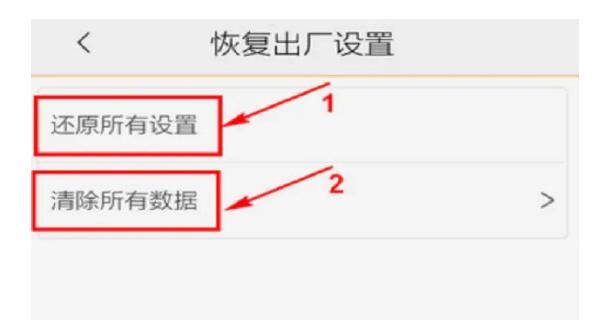 Mobile Tutorial
Mobile Tutorial
 Android Phone
Android Phone
 How to correctly use your phone to restore factory settings (simple operation to easily solve phone problems)
How to correctly use your phone to restore factory settings (simple operation to easily solve phone problems)
How to correctly use your phone to restore factory settings (simple operation to easily solve phone problems)
php editor Baicao provides you with a simple operation guide for restoring factory settings on your phone to help you easily solve phone problems. When our mobile phones have some difficult-to-solve problems, such as freezing, freezing, software conflicts, etc., restoring factory settings is a common solution. By restoring factory settings, you can restore your phone to its factory state, clear all personal data and settings, and make your phone smooth and stable again. In this article, we will introduce you how to use your phone to restore factory settings correctly, allowing you to easily solve phone problems.

#1. What is factory reset?

#2. Why do you need to restore factory settings?
3. Back up data in advance
4. Turn off the "Find My Phone" function

5. Perform a factory reset
6. Pay attention to the battery level during recovery
7. Select the recovery method
8. System recovery time
9. Reset the phone after recovery
10. Download and install necessary applications
11. Backup operations after recovery
12. Pay attention to prevent data loss
13. Solve common problems after recovery
14. Contact after-sales service
15. Precautions for restoring factory settings of mobile phone
paragraph
1. Clear all user data and personal settings and restore factory settings Setting up refers to restoring the phone to its original factory state.
2. Problems such as frequent application crashes and the need to restore factory settings may include slow system operation. These problems can be cleared by restoring factory settings.
3. Be sure to back up important data first to avoid losing it during the recovery process before performing a factory reset.
4. Turn off the "Find My Phone" function to avoid being locked out of use after restoring factory settings.
5. To prevent the operation from failing due to insufficient power during the process, you need to ensure that the phone has sufficient power when performing a factory reset.
6. This function can be found and executed in the phone settings. Depending on the brand and model of the phone, the steps to restore factory settings may be slightly different.
7. Depending on the storage capacity of the phone and the current system status, the process of restoring factory settings may take some time.
8. You need to reset the phone’s language, network connection and other basic configurations, time zone, and restore to factory settings.
9. Need to download and install again. After restoring to factory settings, previously installed applications and games will be deleted.
10. Perform backup operations in a timely manner so that you can quickly restore data when restoring your phone in the future, after restoring factory settings.
11. Avoid accidentally deleting important data, and be careful to choose the correct option when restoring factory settings.
12. So be sure to back up contacts and contacts in advance. Restoring factory settings will clear all data in the phone. Special attention should be paid to text messages, etc., including photos.
13. Some common problems may occur after restoring factory settings, such as system update failure, you can try to restart the phone or restore to the most recent backup, applications cannot be installed normally, etc.
14. You can contact the after-sales service of the mobile phone brand for help if you encounter problems during the factory reset process.
15. You need to pay attention to backing up important data, shutting down, selecting the correct recovery method through "Find My Phone" when performing a factory reset of the phone, and ensuring that the phone has sufficient power and functionality during the operation. Download the necessary apps and take care when resetting your phone after recovery, backing up your data, and troubleshooting common issues.
But you need to be careful when operating. Restoring your phone to factory settings is an effective way to solve some common problems. Close "Find My Phone" by backing up important data to better use the phone's factory reset function to solve problems, and pay attention to choosing the correct recovery method and operation sequence.
The above is the detailed content of How to correctly use your phone to restore factory settings (simple operation to easily solve phone problems). For more information, please follow other related articles on the PHP Chinese website!

Hot AI Tools

Undresser.AI Undress
AI-powered app for creating realistic nude photos

AI Clothes Remover
Online AI tool for removing clothes from photos.

Undress AI Tool
Undress images for free

Clothoff.io
AI clothes remover

Video Face Swap
Swap faces in any video effortlessly with our completely free AI face swap tool!

Hot Article

Hot Tools

Notepad++7.3.1
Easy-to-use and free code editor

SublimeText3 Chinese version
Chinese version, very easy to use

Zend Studio 13.0.1
Powerful PHP integrated development environment

Dreamweaver CS6
Visual web development tools

SublimeText3 Mac version
God-level code editing software (SublimeText3)

Hot Topics
 1655
1655
 14
14
 1414
1414
 52
52
 1307
1307
 25
25
 1254
1254
 29
29
 1228
1228
 24
24
 How to update the image of docker
Apr 15, 2025 pm 12:03 PM
How to update the image of docker
Apr 15, 2025 pm 12:03 PM
The steps to update a Docker image are as follows: Pull the latest image tag New image Delete the old image for a specific tag (optional) Restart the container (if needed)
 Summary of phpmyadmin vulnerabilities
Apr 10, 2025 pm 10:24 PM
Summary of phpmyadmin vulnerabilities
Apr 10, 2025 pm 10:24 PM
The key to PHPMyAdmin security defense strategy is: 1. Use the latest version of PHPMyAdmin and regularly update PHP and MySQL; 2. Strictly control access rights, use .htaccess or web server access control; 3. Enable strong password and two-factor authentication; 4. Back up the database regularly; 5. Carefully check the configuration files to avoid exposing sensitive information; 6. Use Web Application Firewall (WAF); 7. Carry out security audits. These measures can effectively reduce the security risks caused by PHPMyAdmin due to improper configuration, over-old version or environmental security risks, and ensure the security of the database.
 How to create oracle database How to create oracle database
Apr 11, 2025 pm 02:36 PM
How to create oracle database How to create oracle database
Apr 11, 2025 pm 02:36 PM
To create an Oracle database, the common method is to use the dbca graphical tool. The steps are as follows: 1. Use the dbca tool to set the dbName to specify the database name; 2. Set sysPassword and systemPassword to strong passwords; 3. Set characterSet and nationalCharacterSet to AL32UTF8; 4. Set memorySize and tablespaceSize to adjust according to actual needs; 5. Specify the logFile path. Advanced methods are created manually using SQL commands, but are more complex and prone to errors. Pay attention to password strength, character set selection, tablespace size and memory
 What are the common misunderstandings in CentOS HDFS configuration?
Apr 14, 2025 pm 07:12 PM
What are the common misunderstandings in CentOS HDFS configuration?
Apr 14, 2025 pm 07:12 PM
Common problems and solutions for Hadoop Distributed File System (HDFS) configuration under CentOS When building a HadoopHDFS cluster on CentOS, some common misconfigurations may lead to performance degradation, data loss and even the cluster cannot start. This article summarizes these common problems and their solutions to help you avoid these pitfalls and ensure the stability and efficient operation of your HDFS cluster. Rack-aware configuration error: Problem: Rack-aware information is not configured correctly, resulting in uneven distribution of data block replicas and increasing network load. Solution: Double check the rack-aware configuration in the hdfs-site.xml file and use hdfsdfsadmin-printTopo
 What are the oracle11g database migration tools?
Apr 11, 2025 pm 03:36 PM
What are the oracle11g database migration tools?
Apr 11, 2025 pm 03:36 PM
How to choose Oracle 11g migration tool? Determine the migration target and determine the tool requirements. Mainstream tool classification: Oracle's own tools (expdp/impdp) third-party tools (GoldenGate, DataStage) cloud platform services (such as AWS, Azure) to select tools that are suitable for project size and complexity. FAQs and Debugging: Network Problems Permissions Data Consistency Issues Insufficient Space Optimization and Best Practices: Parallel Processing Data Compression Incremental Migration Test
 What is the impact of Redis persistence on memory?
Apr 10, 2025 pm 02:15 PM
What is the impact of Redis persistence on memory?
Apr 10, 2025 pm 02:15 PM
Redis persistence will take up extra memory, RDB temporarily increases memory usage when generating snapshots, and AOF continues to take up memory when appending logs. Influencing factors include data volume, persistence policy and Redis configuration. To mitigate the impact, you can reasonably configure RDB snapshot policies, optimize AOF configuration, upgrade hardware and monitor memory usage. Furthermore, it is crucial to find a balance between performance and data security.
 How to delete all data from oracle
Apr 11, 2025 pm 08:36 PM
How to delete all data from oracle
Apr 11, 2025 pm 08:36 PM
Deleting all data in Oracle requires the following steps: 1. Establish a connection; 2. Disable foreign key constraints; 3. Delete table data; 4. Submit transactions; 5. Enable foreign key constraints (optional). Be sure to back up the database before execution to prevent data loss.
 What to do if the oracle log is full
Apr 12, 2025 am 06:09 AM
What to do if the oracle log is full
Apr 12, 2025 am 06:09 AM
When Oracle log files are full, the following solutions can be adopted: 1) Clean old log files; 2) Increase the log file size; 3) Increase the log file group; 4) Set up automatic log management; 5) Reinitialize the database. Before implementing any solution, it is recommended to back up the database to prevent data loss.



